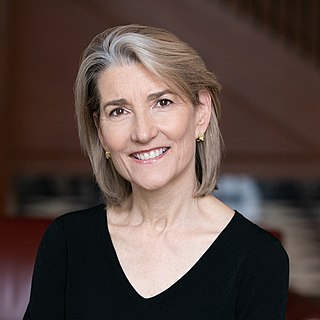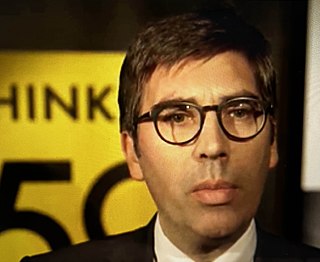
Daniel Goleman is an American psychologist, author, and science journalist. For twelve years, he wrote for The New York Times, reporting on the brain and behavioral sciences. His 1995 book Emotional Intelligence was on The New York Times Best Seller list for a year and a half, a bestseller in many countries, and is in print worldwide in 40 languages. Apart from his books on emotional intelligence, Goleman has written books on topics including self-deception, creativity, transparency, meditation, social and emotional learning, ecoliteracy and the ecological crisis, and the Dalai Lama's vision for the future.

Clayton Magleby Christensen was an American academic and business consultant who developed the theory of "disruptive innovation", which has been called the most influential business idea of the early 21st century. Christensen introduced "disruption" in his 1997 book The Innovator's Dilemma, and it led The Economist to term him "the most influential management thinker of his time." He served as the Kim B. Clark Professor of Business Administration at the Harvard Business School (HBS), and was also a leader and writer in the Church of Jesus Christ of Latter-day Saints. He was one of the founders of the Jobs to Be Done development methodology.

Kathy Giusti is a business leader and a healthcare disrupter. She is a two-time cancer survivor having been diagnosed with multiple myeloma and breast cancer. Kathy Co-Founded the Multiple Myeloma Research Foundation where she was CEO and president for nearly two decades. She also co-chaired the Harvard Business School (HBS) Kraft Precision Medicine Accelerator, which she helped found, as a Senior Fellow at Harvard Business School.
Thomas Hayes "Tom" Davenport, Jr. is an American academic and author specializing in analytics, business process innovation, knowledge management, and artificial intelligence. He is currently the President’s Distinguished Professor in Information Technology and Management at Babson College, a Fellow of the MIT Initiative on the Digital Economy, Co-founder of the International Institute for Analytics, and a Senior Advisor to Deloitte Analytics.

Publicis New York is an American advertising agency based in New York City. It was founded in 1993 and has 2,000 employees with offices in New York, Seattle, Toronto, and Montreal. Publicis acquired the Kaplan Thaler Group in 2012. The agency created the Aflac duck, Herbal Essences Totally Organic Experience, Continental Airlines “Work Hard. Fly Right.", and Swiffer Sweeper campaigns.

Daniel H. Pink is an American author. He has written seven New York Times bestsellers. He was a host and a co-executive producer of the National Geographic Channel social science TV series Crowd Control. From 1995 to 1997, he was the chief speechwriter for Vice President Al Gore.

Martin Lindstrom (Lindstrøm) is a Danish author and Time magazine Influential 100 Honoree. He has written eight books including Small Data: The Tiny Clues that Uncover Huge Trends, Buyology – Truth and Lies About Why We Buy, Brandwashed – Tricks Companies Use to Manipulate Our Minds and Persuade Us to Buy, his first title written for consumers, for which Lindstrom conducted a $3 million word-of-mouth marketing experiment, and 2021 released The Ministry of Common Sense. Brandwashed was inspired by the 2009 film, The Joneses – to study the effects of social influence on purchasing decisions.

Amy Lynn Webb is an American futurist, author and founder and CEO of the Future Today Institute. She is an adjunct assistant professor at New York University's Stern School of Business, a nonresident senior fellow at Atlantic Council, and was a 2014–15 Visiting Nieman Fellow at Harvard University.

Rita Gunther McGrath is an American strategic management scholar and professor of management at the Columbia Business School. She is known for her work on strategy, innovation, and entrepreneurship, including the development of discovery-driven planning.
James J. Manzi is an American technology entrepreneur. He was the founder and chairman of Applied Predictive Technologies that was sold to MasterCard in 2015 for $600 million. He subsequently co-founded the artificial intelligence software company Foundry.ai. He is the inventor of a series of related software patents.
Safi R. Bahcall is an American physicist, technologist, business executive, and author.

Daniel Burrus is an American technology futurist, business adviser, author, and public speaker in the areas of business strategy, global trends, and disruptive innovation. He has written on the topics of business transformation and technology-driven trends, with his book Flash Forsight becoming a New York Times Bestseller in 2011.
Michele Buck is an American businesswoman. In March 2017, she became the first female Chairman, President, and CEO of The Hershey Company, an American food manufacturing company, replacing former CEO John Bilbrey.

Amy C. Edmondson is an American scholar of leadership, teaming, and organizational learning. She is currently Professor of Leadership at Harvard Business School. Edmondson is the author of seven books and more than 75 articles and case studies. She is best known for her pioneering work on psychological safety, which has helped spawn a large body of academic research in management, healthcare and education over the past 15 years. Her books include "Right Kind of Wrong, the Science of Failing Well", “The Fearless Organization,Creating Psychological Safety in the Workplace for Learning, Innovation, and Growth” (2018)) and “Teaming: How Organizations Learn, Innovate and Compete in the Knowledge Economy” (2012).
Marc A. Feigen is an American business executive. As the CEO of Feigen Advisors, he primarily advises CEOs in the Fortune 200, while training and educating new CEOs for the chief executive role. Considered "America's leading coach for CEOs," Feigen has guided more than 35 chief executives of global companies, including Disney, Ford, and Netflix. He is an expert on CEO succession and investor relations.

Susan A. David is a South African psychologist, speaker and author.

Alessandro Di Fiore was an Italian entrepreneur, founder of ECSI, a consulting firm. He also served as the chairman of Harvard Business Review Italia. Di Fiore was best known for developing the “Insight-Driven” Organisation concept and writing the foreword to the book “Strategia Oceano Blu – Vincere senza Competere.”

Benjamin Laker is a former government advisor turned scholar currently serving as Professor of Leadership and Director of Impact and Global Engagement at Henley Business School, University of Reading and Visiting Fellow at Birkbeck, University of London. His work on Economic Inequality and Environmental, Social, and Corporate Governance informs public policy, law and government inquiry.
Talya N. Bauer is the Endowed Cameron Professor of Management at Portland State University. She was president of the Society for Industrial and Organizational Psychology.












